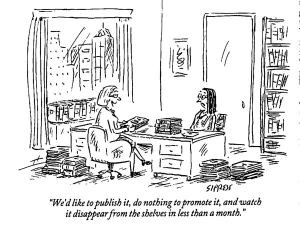And other myths harmful to the new author…
 I was having a discussion with a friend yesterday about a friend of hers who would like to be published. Oh, yes? says I. Cool. What does he write?
I was having a discussion with a friend yesterday about a friend of hers who would like to be published. Oh, yes? says I. Cool. What does he write?
Turns out said friend writes LGBT Fantasy and was interested in learning about finding a publisher vs. self publishing. And here’s where the tearing of hair and sprinkling of ashes begins. Now, to be fair, Mr. Friend of Friend is new to this game. We were all new at one point, and many of us were led astray by bad information. Many of his statements and/ or questions are common ones from new authors and some of them are ones I’ve heard all along the way.
Let’s take a look at some of them, and maybe point out a few painful truths.
1. If I go with a publisher, should I just send them my manuscript?
I will answer this the way I answered my friend in chat. DUDE, READ THE SUBMISSION GUIDELINES. This is, by far, the easiest way to get rejected, by not reading the sub guidelines. Publishers have a process for acquisitions and reasons for requirements. Follow them. Does it guarantee acceptance? Of course not. But if publisher specifies the first three chapters and you send a five hundred page ms? Guess where your submission is going? The big Recycle Bin in the sky.
2. I might want to have a publisher because I can’t put all that time and effort into marketing and stuff.
*sigh* Well, no one can make you put effort into your own visibility. But even a big publisher can’t do it all for you. You have to be invested in your work. This is your work. You’re proud of it, aren’t you? Then be ready to sell it, even if it’s in smaller, quieter ways. Your publisher has dozens to hundreds to thousands of authors, depending on the company’s size. They can’t market everyone like a Stephen King.
3. If I self-publish, a big publisher will come and pick me up down the line, right?
Okay, I know people personally to whom this has happened. It can happen. But the likelihood of it happening? Go outside and try getting struck by lightning. Just you. By yourself. Yeah. It’s about the same odds. The highly motivated author, who’s standing on the top of the hill holding an aerial high and screaming, “Come on thunder!” is a hell of a lot more likely to be picked up, but it’s still something that happens only AFTER you’ve achieved success as a self-published author. You must do something spectacular to draw the Eye of Sauron, er, big publishing. Short answer: don’t count on it, bub.
4. How much money will I make? You write. Are you rich yet?
Dude, you’ve basically just said that you don’t want to do any work for this. Think about it. But in non-sarcastic terms, very few fiction writers ever make a good living from their writing, much less get rich. This is not the driving reason to go into writing fiction. Be very careful before you decide to depend on writing as a primary source of income. The market is fickle and your bills are not.
5. I’m a well-educated person. I know how to write. Why would I pay for an editor?
Because you need one. I’m sorry. I don’t care if you have twelve PhD’s. You need an editor. No one can successfully self-edit his or her work. No one. I’m gonna say that one more time. No one can successfully self-edit his or her work. You’re too close to it. You don’t see the fatal flaws, the plot holes, the character inconsistencies. You won’t even see all your typos. Get a flippity flippin’ editor if you’re self-publishing.
6. Okay, I get it. So my wife can edit my stuff, right?
Um. About that. Once in a great while this works. If you have two writing professionals in the family (husband/wife, brothers, whatever) and they’re both experienced with the editing process, yes, it can, possibly, sometimes, when the moon is blue, work. Most of the time, again, family members are too close. There can be a supertanker full of issues involved that will cause them to be too nice, passive-aggressive, cruel, too critical, etc. and just make the whole editing process an acrimony fest or a waste of time. Additionally, if you’re asking a family member who is not a professional editor to edit your work, you may as well just drive the car off the cliff now. Just…don’t. Please.
Do we know the perfect answers? What the magic formula is? No. But can we tell newer authors about the stuff that doesn’t work and the stuff that will break their hearts? Yes. We can do that, and we should. Answer questions patiently and honestly. Mentor. Connect. Reach out. We’re all in this together.
Any favorite new author myths from the peanut gallery out there?


